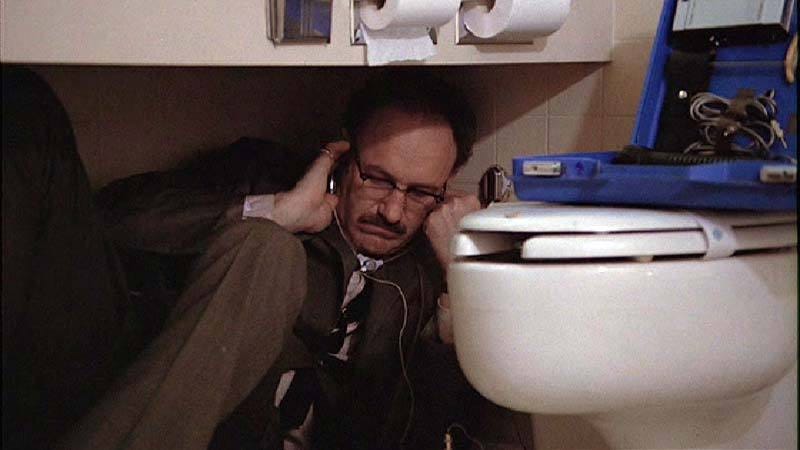Movies of the Month: March [2024]
Nothing says Easter Sunday like a Catholic wiretapper, am I right
Happy Easter to those who celebrate! To mark the moment, I’m bringing you a review of Francis Ford Coppola’s The Conversation (1974), aka: the moral crisis of a Catholic wiretapper.
Let’s get into it:
The Conversation (1974, dir. Francis Ford Coppola) — I texted half my contact list upon leaving The Paris Theater’s screening of this film, urging them to watch it on Netflix immediately. To quote the randos on Letterboxd:
“Catholic wiretapper; forgotten profession”
“Every scene in this movie I go ‘oh this is my favorite part’”
“fuses my two favorite things: jazz and worrying”
SO true.
Written in the late 1960s, The Conversation fortuitously hit theaters on the heels of the Watergate scandal, during a moment when notions of surveillance loomed large in the American public’s collective conscience. Francis Ford Coppola penned the script prior to that of The Godfather (1972), but had trouble getting it funded until he had the the mafia smash hit under his belt. The Conversation ultimately debuted in 1974, just months prior to The Godfather Part II (1974), taking home the Palme d'Or at the 1974 Cannes Film Festival and snagging three Oscar nominations for Best Picture, Best Original Screenplay, and Best Sound (more on that in a bit). TLDR: 1974, unlike 1977 lol, was Coppola’s ~year~.
Coppola’s neo-noir thriller opens over a bustling Union Square in San Francisco. Jazz hums and bleeds into garbled audio. The image becomes clearer. Filmed documentary-style, a couple (played by Cindy Williams and Frederic Forrest) weaves in and out of the frame, between mimes, musicians, hedges. Bits of their conversation — the conversation — crash over, fade behind, the sounds of the square. Their state of surveillance becomes apparent, a job at the hands of expert wiretapper Harry Caul (played brilliantly by Gene Hackman). The narrative unravels from, loops back to, this point, as Harry, faced with delivering the tapes to an executive known as “the Director” (played by Robert Duvall), begins to fear for the couple’s life.
Sounds, its power to trick, to deceive, serves as a driving force behind the narrative and aesthetics of The Conversation. I saw it as part of the The Paris Theater’s anniversary series honoring films released in 1974 with an introduction from journalist and filmmaker Laura Poitras, known for her art thematically centered on notions of mass surveillance. During her talk, Poitras drew a parallel to recent Academy Award Best International Feature Film winner The Zone of Interest (2023), which I discussed in my Oscar round-up a few weeks ago. She pointed to the power of the sound in each film, its immersive impact on the viewer, how it splinters each work into two layers — one visual, one auditory. In The Conversation, Caul listens to that opening exchange again and again, its meaning morphing with each replay. His self becomes split between past and present as Coppola’s narrative unspools through repetition, predicated on cyclicality.
Gene Hackman gives the performance of a lifetime as Harry Caul — and has repeatedly cited it as his finest hour in the ensuing decades. In crafting Hackman’s character, Coppola enacts contemporary author Brandon Taylor’s call to action that I’ve continuously come back to over the past couple of months; he gives his characters values. Harry’s Catholic identity emerges as a guiding force throughout the narrative, texturing its relief. When his paranoia reaches a fever pitch, Harry tears apart his apartment in a fit, pausing only before destroying his statue of Jesus. Surveillance expands beyond the secular into the sacred, into a confession with an anonymous priest. Harry’s religion and profession come to occupy opposite moral poles, culminating in an internal tension expertly embodied by Hackman.
A final fun fact: Harrison Ford plays the Director’s assistant, Martin Stett, an early career performance. This film came on the heels of George Lucas’ American Graffiti (1973), a debut powered by Coppola’s San Francisco-based production company, American Zoetrope, and similarly featuring Ford. Initially, the actor had a small cameo in The Conversation as an office assistant. By playing the part as gay, an audacious character choice for the time, and going so far as to have a custom green suit tailored for costuming, Ford convinced Coppola to expand his role.
Where to Watch: Netflix (subscription)
ICYMI: I also watched a lot of 2024 Oscar-nominated movies this month, and you can check out my thoughts here.
Stay tuned for the April newsletter tomorrow!
xo,
Najet









